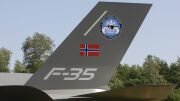The last two weeks signaled a tragic bookend to the Western-led intervention in Afghanistan. Started in the months after the 9/11 attacks, the United States, its NATO allies formed an international coalition to oust the Taliban, find Osama Bin Laden, bring democracy, peace, and stability to the country and stop terrorist organizations, like Al-Qaeda, using Afghanistan as a base of operations. Norway was a small but integral part of this coalition with over 9,200 defense personnel serving in the country. Though the official price tag for Norway’s involvement is estimated at NOK 11.5 billion, there is the untold cost of the death of 10 soldiers, killed in action, and the hundreds more that are physically or mentally scarred from their experiences. With the Taliban back now back in power, did Norway’s involvement in the country really justify the huge price tag?
September 11, 2001: An epoch making day
When the world watched the second plane crash into the south tower of the World Trade Centre, on September 11, 2011, by members of the radical Wahhabi Islamist group, Al-Qaeda, little did we realize how epoch-making that moment was. From that moment on, at least in the Western conscience, time and history changed. There was the pre-9/11 past which we had all carelessly lived up until that point. With that second plane, we had been thrust violently into an age of fear and uncertainty as we had now begun a seemingly never-ending “War on Terror.”
For the United States, and its North Atlantic Treaty Organization (NATO) allies, Afghanistan was seen as “a good fight.” The U.S., and its NATO allies, of which Norway as a member signed up for, established the International Security Assistance Force (ISAF) by early December 2001. Its main purpose was to train the Afghan security forces, rebuild government institutions (which, in turn, helped spread democracy, the rule of law, women’s rights, etc.), and to wage a counter-insurgency against the Taliban, the de facto government of the country where Al-Qaeda had trained and planned the 9/11 attacks.
Norway’s long presence in Afghanistan
Norway, as a key member of NATO and a close ally of the United States, was keen to help the ISAF. According to figures from Norway’s Armed Forces, over 9,200 military personnel served in Afghanistan. The troops were split between Faryab Province and Mazar-i-Sharif where they assisted Swedish and U.S. forces in establishing a Provincial Reconstruction Team. They ultimately became solely responsible for the security in Faryab province, especially from 2005 to 2012. This was after the British decided to focus their forces elsewhere in southern Afghanistan, and were subordinate to German forces who had control of this region.
Norway was keen to focus on conflict management, rather than aggressive military operations, and insisted on the separation between its military forces and civilian operations. This, however, did not stop the violence. 10 Norwegian Armed Forces personnel died, whilst in Afghanistan, including 4 on one day (June 27, 2010) when their vehicle hit a roadside bomb. Deaths were not only limited to military operations with Norwegian civilians (a journalist and a doctor) also dying during Norway’s time in the country.
The government announced, on April 14, 2021, that the last of the Norwegian Forces, 95 personnel including medics and a special forces unit, would be withdrawn “within a few months.” This was after both NATO and the U.S. had announced their decision to withdraw all military troops. For the U.S., weary of a decades-long involvement, President Biden announced forces would leave by the 20th anniversary of the 9/11 attacks. The last Norwegian soldiers returned home, on June 2, signaling an end to more than two decades of involvement in Afghanistan.
With the Taliban back in power, Norway has failed politically
So, after two decades, it appears that history has repeated itself.
Norway joined the ISAF, in part, to oust the Taliban, a religious-military movement known for their harsh enforcement of Sharia law. This broad basket of thugs, bigots, misogynists, homophobes, and deplorables had been entering into negotiations, with the U.S., since 2013, based in Qatar.
The announcement, this year, of the NATO military withdrawal meant the Taliban simply had to bide their time. The withdrawal of NATO troops, from May 2021, signaled the start of an operation for the Taliban to regain control of the country. After 3 and a half months of operations, the Taliban retook the entire country, entering Kabul on August 15. The Afghan government collapsed and President Ashraf Ghani fled.
From a political point of view, Norway’s involvement will be considered a failure as the Taliban are now back in power. There is no way to spin this tragic fact. One of the key aims of the ISAF, of which Norway played a part, was to oust the Taliban. Now that they are in government, they will no doubt, regardless of the optics about a so-called more “tolerant” Taliban, be keen to plunge Afghanistan back into the darkness of religious and ethnic bigotry, misogynism, and violent vigilante justice who opposes them.
Women’s rights and education, the rule of law, democracy, ethnic and religious tolerance, things which the Norwegian civilian involvement worked hard on promoting, will be stamped out shortly.
Despite Defence attache predictions, everyone got it wrong
Given the vast international military presence, including thousands of “boots on the ground,” including Norwegian soldiers, spies, and special forces, how could no one foresee the speed of the Afghan’s governments collapse and the ease at which the Taliban retook the country, mostly without a fight?
The billions of kroner that Norway pumped into the military aspect of its presence there which, up until 2016, accounted for NOK 11.5 billion, evidently did little to either counter the Taliban threat or to help create a strong and unified Afghan security force.
What is most alarmingly about the collapse of the Afghan government, and the strength of the Taliban was the intelligence gathered by Norwegian sources. On August 14, the Norwegian Defence Attache had predicted that the battle for Kabul would begin in the autumn. Yet, less than 3 days after this prediction, Taliban forces streamed into Kabul, overwhelming Afghan government forces, like a wave washing up on the shore.
That not a single person, within the Norwegian defense or intelligence communities, could see that the country would be overrun by the Taliban, after less than 4 months of the beginning of the withdrawal of coalition forces is a disgrace. One wonders what the point was of having spent so much money and having so many Norwegian “boots on the ground,” if basic and obvious intelligence cannot be gathered?
If such a clear and obvious fact is not gathered, what else is the intelligence community missing? Surely both the current and former governments have to be held accountable for this gross and utter intelligence failure.
Norway has let down the people of Afghanistan
Since the 1979 Soviet invasion of Afghanistan, the Afghan people have experienced almost 5 decades of war, death, and pestilence. The hope that the ISAF brought, along with Norway’s involvement, was to rebuild a modern, open, and democratic country from the bottom up. With the Taliban now back in power, the biggest losers, as they have been since 1979, are the Afghan people.
The Taliban has, publically, stated an amnesty for those Afghans who worked with coalition forces and said there would be no reprisals. However, there have now been unconfirmed reports, publicized by the Norwegian Armed Forces, that the Taliban is executing Afghan security forces who worked as part of Norway’s operations in the country.
Here in Norway, several veterans of Norway’s involvement in Afghanistan have voiced their concerns about their former partners and colleagues.
Secretary-General Bjørn Robert Dahl of the Norwegian Veterans Association for International Operations spoke with NTB about the moral duty to reassess, now that the Taliban is in power, many of the cases of Afghans who worked with their Norwegian counterparts.
Political considerations for taking in refugees?
Though Norway has taken in a number of refugees, since the fall of Kabul, and indeed throughout its time involved in Afghanistan, there are many more who were not granted asylum. Perhaps with an eye on the upcoming election in September, with immigration and assimilation seemingly perennial topics nowadays, both Prime Minister Solberg (H) and Labour Party leader Jonas Gahr Støre (AP) do not want to increase the quota for refugees.
For the Taliban, it is a zero-sum game. If you worked with coalition forces, including Norway, however temporarily, or in whatever capacity, you will be classed as an “infidel” and likely tortured or executed. The government is now processing the asylum cases of ten Afghan former cleaners who worked for Norwegian forces. Though they had no military role, there is little doubt that they will face death if left in Afghanistan.
Best of intentions and some great strides made
The reasoning for Norway’s involvement in Afghanistan for more than two decades was for the best of motives. Both the former Stoltenberg government and the current one, led by Prime Minister Solberg, have made women’s rights and gender issues a cornerstone of Norwegian foreign policy.
There was much work done in Afghanistan that Norway can be proud of. As part of the coalition effort in rebuilding Afghanistan life expectancy, literacy levels and the general standard of living have risen. Millions of Afghan women had their first taste of education, employment, voting, and being treated as human beings and active citizens. As a whole generation of girls grew up with access to education, rights, and healthcare there may be demands put upon the Taliban to continue this.
The Norwegian effort should be commended as they worked hard to separate military and civilian aspects of its operations and to further promote gender issues, especially women’s education, during the time in Afghanistan. Improvements in infrastructure saw the improvement of daily life for many in Faryab province with road and water projects.
History won’t be kind for a job not finished properly
Given that Norway was once a war-ravaged country that had to be rebuilt from the ground up, one would have thought that Norway would have had more patience in Afghanistan. History will not be kind as Norway, like all other NATO countries there, simply cut and run. They did not have the political patience, it appears, to trying to properly rebuild a war-damaged nation properly and chaperone it into the international community.
Though Norway could not have done the job alone, it should have put more pressure on the United States, or NATO (especially as ex-Prime Minister Jens Stoltenberg is the top dog there) to “stay the course.” Afghanistan took giant strides during Norway’s time in the country but the foundations were weakly established before this year’s announcement of military withdrawal.
Norway’s exit leaves door open for further Russian and Chinese influence
Russia and China are poised to capitalize on the West’s withdrawal. The sad state of Western military withdrawals, and the reluctance to help former Afghan colleagues and parents, will be music to the ears of propaganda chiefs in Moscow and Beijing. As the West retreats, authoritarian regimes will point to the uselessness of democracy, intentional cooperation, and the rules-based system underpinning international relations since 1945.
The end of Norway’s involvement in Afghanistan will definitely aid Russia in the so-called “Cold War 2.0.” The retreat of Norway, a Western modern and progressive democracy, that champions gender equality and women’s rights worldwide, from Afghanistan, will surely be used by Russia for propaganda purposes. It will point to the fact that, unlike Norway, it has a beneficial presence in the Islamic world through its cooperation with the Assad regime in Syria.
What can Norway, and the West, learn?
So what lessons can Norway, and the West in general learn, after two decades of involvement in Afghanistan? Though Norway joined up with the best of intentions, did the ISAF, really, achieve anything? The gains of the past two decades will quickly disappear now that the Taliban has a thuggish grip on power.
Afghanistan will, no doubt, once again be a breeding ground for terrorists even more so now that the Taliban has the extra prestige of “defeating” the West. Women, ethnic and religious minorities will be persecuted along with the many Afghans who worked with the Norwegian presence. With Canada announcing it would take in 20,000 Afghans, Norway should surely have a moral duty to increase its refugee quota specifically for Afghanis. How many Afghans will needlessly die for the “crime” of working with Norwegians?
Norway should have pushed its coalition partners harder, to ensure, regardless of domestic political calculations, that, at a minimum, the Afghan security forces and government institutions were established on a firmer footing. Instead, both folded within days of Afghan forces moving onto Kabul. Was this NOK 11.5 billion well spent?
The final thought, though, should go to the Norwegian personnel who served, in any capacity, during Norway’s involvement in Afghanistan. 10 military personnel, and 2 civilians, will never see their families or friends again. Many who have returned will never be the same again due to physical or mental scars.
Also, spare a thought for the now hunted Afghans who bravely helped the Norwegian presence try to rebuild the country from ruin. As Norway exits Afghanistan, there is only sadness and sorrow at a huge personal and economic cost.
The opinions expressed are those of the author and are not held by Norway Today unless specifically stated.
About the author:
Jonathan is a lover of the written word. He believes the best way to combat this polarization of news and politics, in our time, is by having a balanced view. Both sides of the story are equally important. He also enjoys traveling and live music.
Source: #Norway Today / #NorwayTodayNews
Do you have a news tip for Norway Today? We want to hear it. Get in touch at [email protected]




I assume Jonathan is English, and such a column as this is no surprise, albeit nonetheless disgusting.
No, it was not at all worth it to Norway (or the American or English *people*), and next time we and Britain and/or the EU want to lead Norwegians into something, please critically question it/us. Don’t just blindly follow us. That should be Norwegians’ lesson.
As to Norway “pushing” us? (like the English did) to stay in there and impossibly after 20 years try to have the (urban) Afghans ready and able to defend themselves from their own vastly outnumbering and Islamistly immutable tribesmen, forget it. We the American People decided enough is enough years ago, and Trump and Biden are finally responding.
I ask readers to also consider my comment under the other article, at https://norwaytoday.info/news/norway-spent-billions-of-kroner-on-efforts-in-afghanistan-what-was-the-effect/
And *Norway’s* exit leaves the door open to Russian and Chinese “influence” in The Graveyard of Empires? 🙂
The Rs and Cs are welcome to the place! The only time in its history Afghanistan was ever really pacified was for 100 years by the Mongols … using their methods.
Jonathan! If you(?) English (and the French, to hear Macron) have forgotten 1842 and want to stay in there and fight the Taliban and Russians and Chinese, go for it. I’m amazed the British Army hasn’t mutinied by now. Note how many of the Jan. 6 invaders of our U.S. Capitol were veterans.
By the way, 2 of my ggg granduncles died in the 1857 Cawnpore (India) Massacre.
As U.S. General James Mattis recently released a podcast “Reality is a Terrible Adversary.”
And by the way, if you like boardgames and military and naval history, Jonathan, check out my CoatneyHistory webpage. I’m even finishing a little “Postcard Tobruk” WW2 minigame.
But strategically, Afghanistan – wherein our servicepeople have been surrounded on ALL sides and were instant prisoners and hostages in any nuclear superpower showdown – is no Tobruk (which could directly supplied by the Royal Navy from the sea, if at cost).